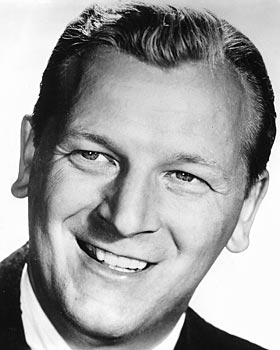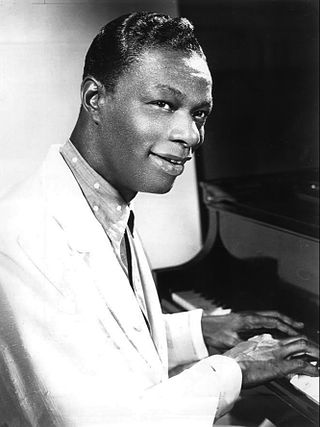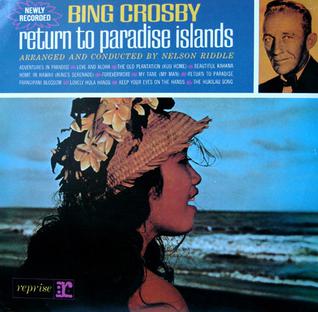Related Research Articles

Leslie Thompson Baxter was an American musician, composer and conductor. After working as an arranger and composer for swing bands, he developed his own style of easy listening music, known as exotica and scored over 250 radio, television and motion pictures numbers.

Nelson Smock Riddle Jr. was an American arranger, composer, bandleader and orchestrator whose career stretched from the late 1940s to the mid-1980s. He worked with many vocalists at Capitol Records, including Frank Sinatra, Ella Fitzgerald, Nat King Cole, Judy Garland, Dean Martin, Peggy Lee, Johnny Mathis, Rosemary Clooney and Keely Smith. He scored and arranged music for many films and television shows, earning an Academy Award and three Grammy Awards. He found commercial and critical success with a new generation in the 1980s, in a trio of Platinum albums with Linda Ronstadt.

Axel Stordahl was an American arranger who was active from the late 1930s through the 1950s. He is perhaps best known for his work with Frank Sinatra in the 1940s at Columbia Records. With his sophisticated orchestrations, Stordahl is credited with helping to bring pop arranging into the modern age.

"The Teddy Bears' Picnic" is a song consisting of a melody written in 1907 by American composer John Walter Bratton, and lyrics added in 1932 by Irish songwriter Jimmy Kennedy. It remains popular in the United Kingdom as a children's song, having been recorded by numerous artists over the decades. Kennedy lived at Staplegrove Elm and is buried in Staplegrove Church, in Taunton, Somerset, England. Local folklore has it that the small wooded area between the church and Staplegrove Scout Hut was the inspiration for his lyrics.
"C'est si bon" is a French popular song composed in 1947 by Henri Betti with the lyrics by André Hornez. The English lyrics were written in 1949 by Jerry Seelen. The song has been adapted in several languages.
"The Christmas Song" is a classic Christmas song written in 1945 by Robert Wells and Mel Tormé.

"White Christmas" is an Irving Berlin song reminiscing about an old-fashioned Christmas setting. The song was written by Berlin for the 1942 musical film Holiday Inn. The composition won the Academy Award for Best Original Song at the 15th Academy Awards.

"The Way You Look To-night" is a song from the film Swing Time that was performed by Fred Astaire and composed by Jerome Kern with lyrics written by Dorothy Fields. It won the Academy Award for Best Original Song in 1936. Fields remarked, "The first time Jerry played that melody for me I went out and started to cry. The release absolutely killed me. I couldn't stop, it was so beautiful."
"I Love Paris" is a popular song written by Cole Porter and published in 1953. The song was introduced by Lilo in the musical Can-Can. A line in the song's lyrics inspired the title of the 1964 movie Paris When It Sizzles.
"I Wished on the Moon" is a song composed by Ralph Rainger, with lyrics by Dorothy Parker. Bing Crosby sang the song in The Big Broadcast of 1936.
"(You'd Be So) Easy to Love" is a popular song written by Cole Porter for William Gaxton to sing in the 1934 Broadway show Anything Goes. However Gaxton was unhappy about its wide vocal range and it was cut from the musical. Porter re-wrote it for the 1936 film Born to Dance, where it was introduced by Eleanor Powell, James Stewart, and Frances Langford under its alternate title, "Easy to Love". The song was later added to the 1987 and 2011 revivals of Anything Goes under the complete title "You’d Be So Easy to Love".

"I Don't Stand a Ghost of a Chance With You" is a 1932 song recorded by Bing Crosby with Orchestral Accompaniment. The music was composed by Victor Young, with lyrics written by Ned Washington and Bing Crosby. The song is a jazz and pop standard recorded by many different artists.
"What's New?" is a 1939 popular song composed by Bob Haggart, with lyrics by Johnny Burke. It was originally an instrumental tune titled "I'm Free" by Haggart in 1938, when Haggart was a member of Bob Crosby and His Orchestra. The tune was written with a trumpet solo, meant to showcase the talents of band-mate Billy Butterfield. Crosby's orchestra recorded "I'm Free" the same day it was written.
"Mean to Me" is a popular song with music by Fred E. Ahlert and lyrics by Roy Turk, published in 1929. Hit versions that year were by Ruth Etting and by Helen Morgan. Ben Bernie and the Hotel Roosevelt Orchestra also recorded what might be the first male version in February 1929 with vocals by Scrappy Albert.

"Mona Lisa" is a popular song written by Ray Evans and Jay Livingston for the Paramount Pictures film Captain Carey, U.S.A. (1949). The title and lyrics refer to the renaissance portrait Mona Lisa painted by Leonardo da Vinci. The song won the Oscar for Best Original Song in 1950.

The Nat King Cole Story is a 1961 album by Nat King Cole. The album was a retrospective of Cole's recording career, designed to present many of his earlier hits in new recordings featuring stereo sound. Cole is accompanied on the re-recordings by many of the notable arrangers and bands that had appeared with him on the original records.
"I Can't Believe That You're in Love with Me" is a 1926 popular song composed by Jimmy McHugh, with lyrics by Clarence Gaskill.

Join Bing and Sing Along is a long-playing vinyl album issued first by RCA Victor (LPM/LSP-2276) and immediately thereafter by Warner Bros. Records (W/WS-1363) in 1960. The album consists of twelve medleys of 33 old songs in a singalong format. Bing Crosby sings on all of the tracks except those marked with an asterisk. The chorus and orchestra is conducted by Jack Halloran and their tracks were pre-recorded on November 9 & 13, 1959 with Crosby over-dubbing his vocals. Orchestral arrangements were by Bob Thompson.

Return to Paradise Islands is a long-playing vinyl album of Hawaiian themed songs recorded by Bing Crosby for Reprise Records (R-6106) at three separate sessions in 1963. The tracks were arranged by Nelson Riddle who also conducted the orchestra.

Music of the Motion Picture “Can Can” was the Nelson Riddle Orchestra's eighth studio LP, released on Capitol records in 1960.
References
- ↑ "Can Can : Opening Night Cast". IBDb.com. Retrieved March 24, 2020.
- ↑ Whitburn, Joel (1973). Top Pop Records 1940-1955. Record Research.
- ↑ "Can Can : 1953 : Gordon Jenkins and his Orchestra". Castalbums.org. Retrieved March 24, 2020.
- ↑ "Allez-Vous-En : Teddy Johnson". 45worlds.com. Retrieved March 24, 2020.
- ↑ "Irene Hilda : Edmund Hockridge : Can Can". Discogs.com. Retrieved March 24, 2020.
- ↑ "Can Can : Nelson Riddle". AllMusic . Retrieved March 24, 2020.